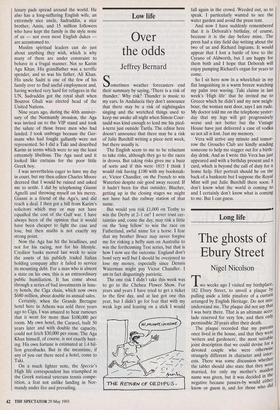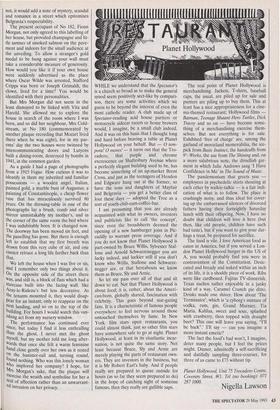Long life
The ghosts of Ebury Street
Nigel Nicolson
Two weeks ago I visited my birthplace, 182 Ebury Street, to unveil a plaque by pulling aside a little pinafore of a curtain arranged by English Heritage. Do not mis- understand me. The plaque did not say that I was born there. That is an ultimate acco- lade reserved for very few, and then only permissible 20 years after their death. The plaque recorded that my parents once lived in the house, and that they were `writers and gardeners', the most suitable joint description that we could devise for a devoted couple who were otherwise strangely different in character and inter- ests. There was some discussion whether the tablet should also state that they Were married, for only my mother's Malden name was given, but it was decided in the negative because passers-by would either know or guess it, and for those who di not, it would add a note of mystery, scandal and romance in a street which epitomises Belgravia's respectability. The present occupant of No 182, Fionn Morgan, not only agreed to this labelling of her house, but provided champagne and lit- tle tartines of smoked salmon on the pave- ment and indoors for the small audience at the unveiling. To allow a stranger's gold medal to be hung against your wall must take a considerable measure of generosity. How would you like it if your own house were suddenly advertised as the place where Oscar Wilde was arrested, Stafford Cripps was born or Joseph Grimaldi, the clown, lived for a time? You would be identified with their personalities. But Mrs Morgan did not seem in the least dismayed to be linked with Vita and Harold. She allowed me to explore the house in search of the room where I was born, and so did her neighbour, Mrs Cold- stream, at No 180 (commemorated by another plaque recording that Mozart lived there when he was eight), for in my par- ents' day the two houses were twinned by intercommunicating doors and Lutyens built a dining-room, destroyed by bombs in 1941, in the common garden. As a guide I had a page of photographs from a 1915 Vogue. How curious it was to identify in them my inherited and familiar possessions — a wooden angel, Italian, painted gold, a marble bust of Augustus, a painting of Constantinople, a cheap flower vase that has miraculously survived 80 Years. On the dressing-table in one of the photographs lay a brush, comb and silver mirror unmistakably my mother's, and in the corner of the same room the bed where I was indubitably born. It is changed now. The doorway has been moved six feet, and the panelling has gone. But there is enough left to establish that my first breath was drawn from this very cube of air, and one Cannot retrace a long life further back than that.
We left the house when I was five or six, and I remember only two things about it. On the opposite side of the street there was, and still is, a block of flats which had a staircase built into the facing wall, like Azay-le-Rideau's but less decorative. As the tenants mounted it, they would disap- pear for an instant, only to reappear on the next landing, and so on to the top of the building. For hours I would watch this van- ishing act from my nursery window. The performance has continued ever since, but today I find it less enthralling than the ghost. I never met the ghost myself, but my mother told me long after- Wards that once she felt a warm feminine hand close gently over her own as it rested on the banister-rail and, turning round, found nothing. Who was this lonely woman who implored her company? I hope, for Mrs Morgan's sake, that the plaque will exorcise the wraith and symbolise for her a seal of affection rather than an unwarrant- ed intrusion on her privacy.



















































 Previous page
Previous page